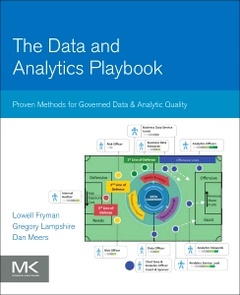Description
The Data and Analytics Playbook
Proven Methods for Governed Data and Analytic Quality
Authors: Fryman Lowell, Lampshire Gregory, Meers Dan
Language: English
Subjects for The Data and Analytics Playbook:
Keywords
Activity cards; Analytics; Assessment; Audit; Big data; Bigdata; Business glossary; Business sponsors; Business terms; Capability; Catalyst; Compliance and audit tools; Data analysis; Data analytics; Data assets; Data capabilities; Data Catalog; Data controls; Data cycle; Data cycles; Data governance; Data lineage; Data management; Data officers; Data playbook; Data quality dashboard; Data quality metrics; Data standards; Data stewardship; Data; Deployment; Execution; Governance management; Governance technology; Governance toolkit; Governance workflow; Governance; Issue management; IT assets; Master data; Metadata repository; Metadata; Metrics; Mobile collaboration; Operational model; Operations; Organizational models; Playbook; Reference data; Regulatory compliance; Report creation; Sales force automation; Security; Semantics; Software evaluation; Vocabulary; Workflow
51.74 €
In Print (Delivery period: 14 days).
Add to cart292 p. · 19x23.3 cm · Paperback
Description
/li>Contents
/li>Biography
/li>Comment
/li>
The Data and Analytics Playbook: Proven Methods for Governed Data and Analytic Quality explores the way in which data continues to dominate budgets, along with the varying efforts made across a variety of business enablement projects, including applications, web and mobile computing, big data analytics, and traditional data integration.
The book teaches readers how to use proven methods and accelerators to break through data obstacles to provide faster, higher quality delivery of mission critical programs. Drawing upon years of practical experience, and using numerous examples and an easy to understand playbook, Lowell Fryman, Gregory Lampshire, and Dan Meers discuss a simple, proven approach to the execution of multiple data oriented activities. In addition, they present a clear set of methods to provide reliable governance, controls, risk, and exposure management for enterprise data and the programs that rely upon it.
In addition, they discuss a cost-effective approach to providing sustainable governance and quality outcomes that enhance project delivery, while also ensuring ongoing controls. Example activities, templates, outputs, resources, and roles are explored, along with different organizational models in common use today and the ways they can be mapped to leverage playbook data governance throughout the organization.
1. Purpose, Scope and Audience 2. Executive Call to Action—How Chief Data Officers and Business Sponsors Can Empower Results 3. Assessing Conditions, Controls and Capabilities 4. Detailed Playbook Activities 5. Aligning the Language of Business: The Business Glossary 6. The Business Data Governance Toolkit 7. Playbook Deployment 8. Data Governance as an Operations Process 9. Governing Big Data and Analytics 10. Rapid Playbook Deployment
Gregory Lampshire has started and led consulting practices and product development efforts in multiple industries including financial services, healthcare, life sciences, telecommunications and energy. His work in work in playbook development and deployment extends to multiple data sprints addressing complex financial crimes detection and prevention solutions in large financial services institutions. He has a strong background in advanced sales and marketing strategy and analytics, sales & marketing processes including strategic and operational segmentation, targeting, acquisition and retention. He has built and deployed multiple front-line CRM applications. His clients and companies have won a variety of innovation awards win awards in bringing analytics to customer touchpoints.
Dan Meers serves as the President of K2 Solutions LLC, and manages the Reston, VA based consultancy solving complex data centric problems with asset based consulting se
- Provides a mature and proven playbook approach (methodology) to enabling data governance that supports agile implementation
- Features specific examples of current industry challenges in enterprise risk management, including anti-money laundering and fraud prevention
- Describes business benefit measures and funding approaches using exposure based cost models that augment risk models for cost avoidance analysis and accelerated delivery approaches using data integration sprints for application, integration, and information delivery success




